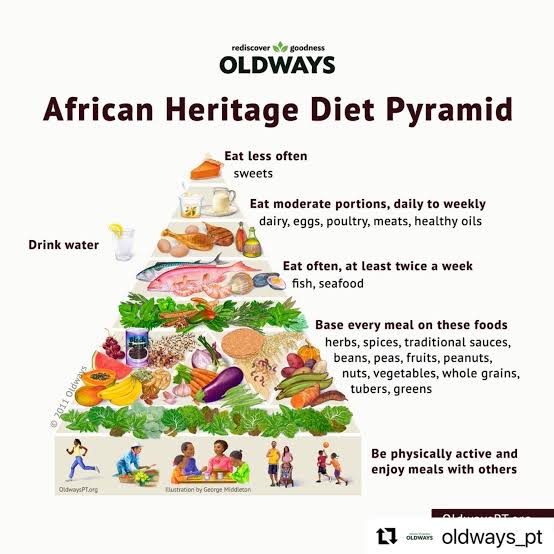African cuisine is a rich tapestry of flavors, colors, and traditions that have been passed down through generations. Beyond its deliciousness, African food offers a treasure trove of health benefits that often go unnoticed. In this comprehensive guide, we will explore the many facets of African-inspired diets and the traditional ingredients that contribute to health and wellness. From the vibrant markets of West Africa to the aromatic kitchens of North Africa and the spice-filled dishes of East Africa, let’s embark on a journey to discover the secrets of a healthy African diet.

The Diversity of African Cuisine
Africa is a vast continent with diverse cultures, landscapes, and cuisines. From the staple dishes of North Africa like couscous and tagines to the hearty stews of West Africa such as jollof rice and fufu, the variety of African cuisine is astounding. Each region has its unique ingredients, preparation methods, and health benefits.
Nutrient-Rich Traditional Ingredients
a. Grains and Tubers
African diets often include nutrient-rich grains and tubers like millet, sorghum, yams, and cassava. These staples are high in fiber, complex carbohydrates, and essential vitamins.
b. Leafy Greens
Leafy greens such as collard greens, spinach, and amaranth are commonly used in African dishes. They are excellent sources of vitamins A and C, iron, and antioxidants.
c. Legumes
Legumes like cowpeas, lentils, and peanuts are rich in protein and fiber, making them essential for muscle growth and digestion.
d. Spices and Herbs
African cuisine relies heavily on spices and herbs like ginger, garlic, and turmeric, which have anti-inflammatory and medicinal properties.
Health Benefits of African Diets
a. Heart Health
African diets are typically low in saturated fats and high in heart-healthy fats like those found in nuts and seeds. This can help reduce the risk of cardiovascular diseases.
b. Weight Management
The fiber-rich nature of many African ingredients promotes a feeling of fullness, aiding in weight management and reducing overeating.
c. Diabetes Prevention
The low glycemic index of African staples like millet and sorghum can help regulate blood sugar levels, reducing the risk of type 2 diabetes.
d. Immune Support
African diets rich in colorful fruits and vegetables provide essential vitamins and antioxidants that support a robust immune system.
e. Digestive Health
The combination of fiber-rich foods and probiotic-rich fermented dishes like injera (Ethiopian flatbread) can promote healthy digestion.
Traditional African Diets in Practice
a. Mediterranean Diet
The Mediterranean diet, which includes North African cuisine, is renowned for its health benefits. It emphasizes olive oil, whole grains, and lean proteins.
b. Plant-Based Diets
Many African cultures have plant-based diets with minimal animal products, making them suitable for vegetarians and vegans.
c. Mindful Eating
African dining customs often promote mindful eating, encouraging people to savor their food and eat slowly.
- Cultural Significance of African Food
a. Social Bonding
African meals are often communal affairs, fostering social bonds and promoting mental well-being.
b. Rituals and Celebrations
African cuisine plays a significant role in cultural rituals and celebrations, connecting people to their heritage and promoting a sense of belonging.
African Superfoods
a. Baobab Fruit
The baobab fruit is a nutrient powerhouse, containing high levels of vitamin C, fiber, and antioxidants. It’s used in beverages and desserts.
b. Moringa
Moringa leaves are packed with vitamins, minerals, and amino acids, earning it the title of “superfood.”
c. Teff
Teff is a gluten-free grain that’s a great source of iron and calcium, often used to make injera in Ethiopia.

Incorporating African Cuisine Into Your Diet
a. Start Slowly
If you’re new to African cuisine, start by incorporating one or two dishes into your weekly meal plan.
b. Explore African Restaurants
African restaurants offer an authentic experience, allowing you to try a variety of dishes.
c. Cooking at Home
Experiment with African recipes and traditional ingredients in your own kitchen. Online resources and cookbooks can be valuable tools.

African cuisine is not only a delight for the taste buds but also a source of remarkable health benefits. From promoting heart health to supporting weight management and immune function, the African diet is a hidden gem in the world of nutrition. By exploring the diverse dishes and traditional ingredients of this continent, you can embark on a journey toward better health and wellness, one delicious meal at a time.

